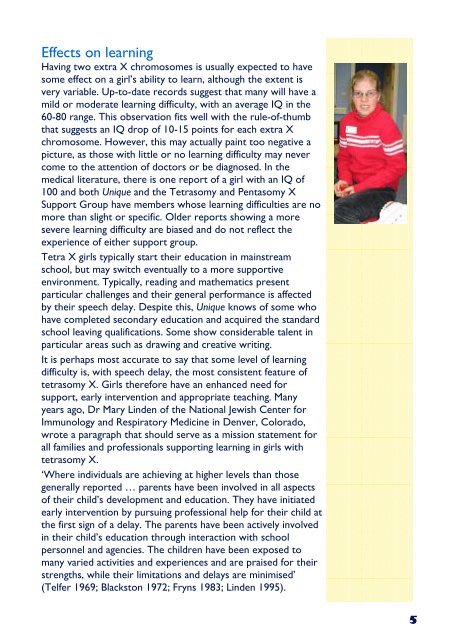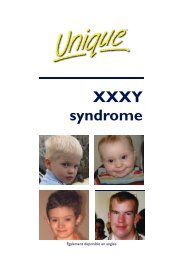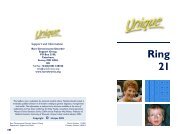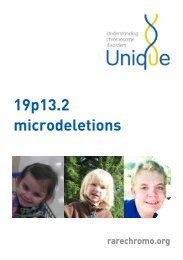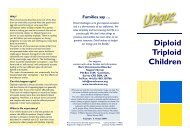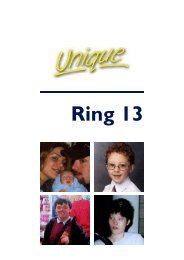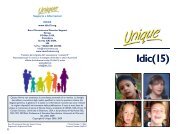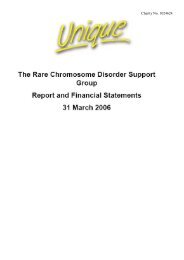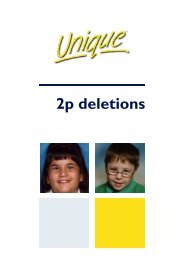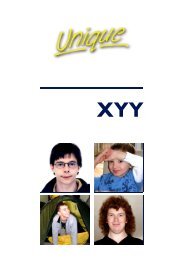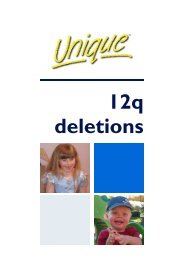Tetra X FTNW.pub - Unique - The Rare Chromosome Disorder ...
Tetra X FTNW.pub - Unique - The Rare Chromosome Disorder ...
Tetra X FTNW.pub - Unique - The Rare Chromosome Disorder ...
Create successful ePaper yourself
Turn your PDF publications into a flip-book with our unique Google optimized e-Paper software.
Effects on learning<br />
Having two extra X chromosomes is usually expected to have<br />
some effect on a girl’s ability to learn, although the extent is<br />
very variable. Up-to-date records suggest that many will have a<br />
mild or moderate learning difficulty, with an average IQ in the<br />
60-80 range. This observation fits well with the rule-of-thumb<br />
that suggests an IQ drop of 10-15 points for each extra X<br />
chromosome. However, this may actually paint too negative a<br />
picture, as those with little or no learning difficulty may never<br />
come to the attention of doctors or be diagnosed. In the<br />
medical literature, there is one report of a girl with an IQ of<br />
100 and both <strong>Unique</strong> and the <strong>Tetra</strong>somy and Pentasomy X<br />
Support Group have members whose learning difficulties are no<br />
more than slight or specific. Older reports showing a more<br />
severe learning difficulty are biased and do not reflect the<br />
experience of either support group.<br />
<strong>Tetra</strong> X girls typically start their education in mainstream<br />
school, but may switch eventually to a more supportive<br />
environment. Typically, reading and mathematics present<br />
particular challenges and their general performance is affected<br />
by their speech delay. Despite this, <strong>Unique</strong> knows of some who<br />
have completed secondary education and acquired the standard<br />
school leaving qualifications. Some show considerable talent in<br />
particular areas such as drawing and creative writing.<br />
It is perhaps most accurate to say that some level of learning<br />
difficulty is, with speech delay, the most consistent feature of<br />
tetrasomy X. Girls therefore have an enhanced need for<br />
support, early intervention and appropriate teaching. Many<br />
years ago, Dr Mary Linden of the National Jewish Center for<br />
Immunology and Respiratory Medicine in Denver, Colorado,<br />
wrote a paragraph that should serve as a mission statement for<br />
all families and professionals supporting learning in girls with<br />
tetrasomy X.<br />
‘Where individuals are achieving at higher levels than those<br />
generally reported … parents have been involved in all aspects<br />
of their child’s development and education. <strong>The</strong>y have initiated<br />
early intervention by pursuing professional help for their child at<br />
the first sign of a delay. <strong>The</strong> parents have been actively involved<br />
in their child’s education through interaction with school<br />
personnel and agencies. <strong>The</strong> children have been exposed to<br />
many varied activities and experiences and are praised for their<br />
strengths, while their limitations and delays are minimised’<br />
(Telfer 1969; Blackston 1972; Fryns 1983; Linden 1995).<br />
5


